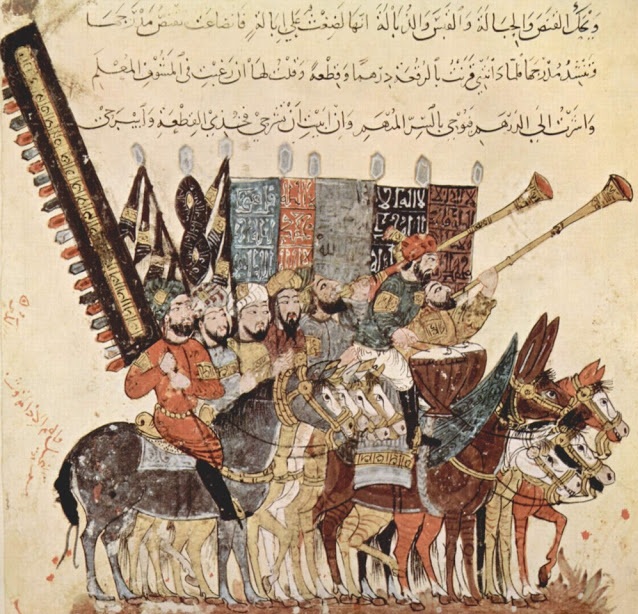 In September, President Barack Obama addressed the nation about terrorism. [1] He assured Americans that the country was safer than it was on 9/11 or when it “[took] the fight to terrorists who threaten our country.” But he also cautioned that terrorism remained a danger.
In September, President Barack Obama addressed the nation about terrorism. [1] He assured Americans that the country was safer than it was on 9/11 or when it “[took] the fight to terrorists who threaten our country.” But he also cautioned that terrorism remained a danger.
Unsurprisingly, the President singled out “ISIL,” also known as “ISIS” and the “Islamic State.” The first thing he said about this group was, “ISIL is not ‘Islamic.’” According to President Obama, “ISIL is a terrorist organization, pure and simple. And it has no vision other than the slaughter of all who stand in its way.”
Hardly anyone doubts the brutality of the Islamic State, least of all the group itself. But is it really “not ‘Islamic’”? Not if one considers its own theological claims.
Considering the theological claims of ISIS and other Muslim groups is what Dr. Timothy Furnish recently did in a lecture sponsored by the Concordia Seminary’s Ethnic Immigrant Institute of Theology (EIIT). Dr. Furnish, whose background includes service in the US Army, an M.A.R. from Concordia, and a Ph.D. in Islamic history from The Ohio State University, regularly writes, speaks, and consults on Islamic eschatology and its significance for contemporary politics. At Concordia he spoke about the eschatology of ISIS and other Islamic groups, and about its significance.
Why eschatology? Because beliefs about the end times are often central to the motives of Islamic groups. This is certainly the case with ISIS. Dr. Furnish illustrated eschatology of ISIS with Dabiq,their English-language magazine. The name itself refers to a Syrian town where, according to a hadith (a saying by the Prophet Muhammad), a great battle will be fought, ushering in the last times. And there is more than the name. The magazine makes it clear that ISIS believes it is engaging in an end-times struggle against forces of unbelief, injustice, and evil—including Christianity. They are, in the words of Dr. Furnish’s title, “fighting for the end of the [Christian] world.”
Dr. Furnish also noted that belief in the so-called Mahdi, or “Rightly-Guided One,” is also basic to the eschatology of ISIS and other groups. Islamic theology has two faithful eschatological figures: Jesus and the Mahdi. According to the hadith, the Mahdi will arise to defeat non-Muslims and evil powers. He and Jesus will establish a global caliphate that will bring justice upon the earth.
Throughout history, there have been many who have claimed to be the Mahdi. Recent times have been no different. Dr. Furnish pointed out that, followers of Juhayman al-Utaybi who occupied the Great Mosque in Mecca in 1979, claimed his brother-in-law to be the Mahdi. The Jund al-Sama’ (or “Army of Heaven”) in Iraq and Jabhat al-Nusra (or the Nusra Front) in Syria are both Mahdist, believing that the last days are upon us and fighting in the expectation that the Mahdi is about to appear. So is ISIS.
Belief in the Mahdi, moreover, is common among Muslims. Many believe his return is immanent. A 2012 Pew survey that Dr. Furnish referred to found that more than 40% of those surveyed expected the Mahdi to appear in their lifetimes. [2]
At the end of his lecture, Dr. Furnish turned away from Islamic eschatology in world politics and toward the implications for Christian conversation and witness. He pointed out how important knowing about Muslim beliefs is today, and about how to answer questions. For this, as in other things, Jesus is the key. What is he coming back to do? Whom is he coming back for? What will his return mean? Christians must be clear about their own answers, as well as have an idea about what Muslims are likely to believe.
But more than knowing about Muslims and their beliefs, “Muslims must know we care about them as persons.” This is a basic principle for all witness, but it can be harder to follow when we see some of them “fighting for the end of the [Christian] world.” But that is the way of the Lord Jesus Christ.
[1] “Statement by the President on ISIL,” 10 September 2014, Office of the Press Secretary, The White House. http://www.whitehouse.gov/the-press-office/2014/09/10/statement-president-isil-1. Accessed 27 October 2014.
[2] Pew Forum on Religion and Public Life, “The World’s Muslims: Unity and Diversity,” 12 August 2012. http://www.pewforum.org/Muslim/the-worlds-muslims-unity-and-diversity.aspx. Accessed 27 October 2014.

Leave a Reply
You must be logged in to post a comment.